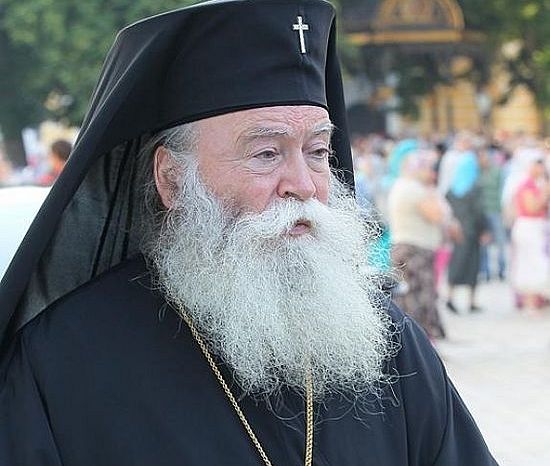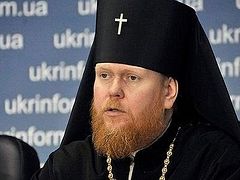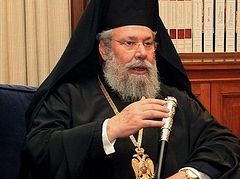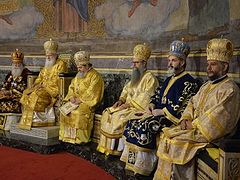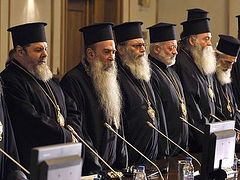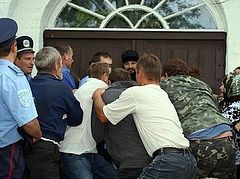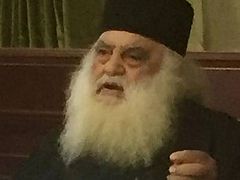Sofia, October 10, 2018
A decision on the admissibility or inadmissibility of the actions of the Ecumenical Patriarchate in Ukraine can only be made by a pan-Orthodox Council, several hierarchs of the Holy Synod of the Bulgarian Orthodox Church believe.
A new statement on the matter by Metropolitans Gabriel of Lovech, John of Varna, and Daniil of Vidin has been posted on the Bulgarian Patriarchate’s official site.
However, it was recently reported that Constantinople has rejected the idea of convoking a council on the matter. Moreover, the Holy Synod of the Ecumenical Patriarchate is currently meeting, and it is widely expected that they will make a unilateral decision on Ukraine today or tomorrow.
The Bulgarian Holy Synod considered the situation that has developed in Ukraine due to the Ecumenical Patriarchate’s actions there during its regular meeting of October 4. At that time, the bishops declined to make an official call for a pan-Orthodox council.
Their decision has been widely reported as a lack of support for, or even a back-handed attack on the Russian Church in this matter, though that is a serious misunderstanding of the Synod’s decision. According to a source within the Bulgarian Patriarchate, what the bishops declined to do is to take the initiative of calling a council themselves. They neither said that a council is not needed, nor that they would not attend were one to be called.
However, the Synod did establish a committee to investigate the issue further, which will take the opinion of Metropolitans Gabriel, John, and Daniil, who have themselves made an appeal for a pan-Orthodox Council following the Synod meeting, into consideration.
Arguing their position, the metropolitans point to the “inconsistencies between the stated motives of the Patriarchate of Constantinople with regard to unilateral interference in the affairs of a Local Orthodox Church and the real consequences of such interference.”
Representatives of the Ecumenical Patriarchate have stated that they see no reason why their interference in Ukraine will lead to any further Church problems, although it has already led to an obvious strain in relations with the Moscow Patriarchate.
As the hierarchs note, the creation of a parallel ecclesiastical structure, as there was in Bulgaria from 1992 to 2004, would entail the seizure of churches and other Church property of the canonical Church.
“Who will take responsibility for all those people who lives will be threatened in Ukraine when they stand up to defend their holy places—churches and monasteries—in the event that their registration for the canonical Orthodox Church, to which they belong, is canceled, which Ukrainian politicians openly speak about?” the bishops ask.
The Bulgarian hierarchs also note that Constantinople’s actions—challenging the documented decision of 300 years ago, when the Kiev Metropolia was joined to the Russian Orthodox Church—are inconsistent with the holy canons of the Church.
“It is especially important to remember the 133rd canon of the local Council of Carthage in 419, according to which three years are provided for resolving claims regarding territories belonging to the jurisdiction of a bishop. The 17th canon of the Fourth Ecumenical Council and the identical 25th canon of the Sixth (Trullan) Ecumenical Council determine the statute of limitations for disputes about the accession of parishes to the diocese of a lawful as thirty years,” the metropolitans argue.
The Bulgarian hierarchs also argue that the Ecumenical Patriarch’s incursion into the canonical territory of another Local Church has created “a problem that cannot be solved between the two patriarchates.” In this they somewhat disagree with the Holy Synod of the Georgian Orthodox Church, which has called for the issue to be resolved precisely between the Ecumenical and Moscow Patriarchates.
Considering the strain in relations between the two patriarchates, if the dispute deepens, “it will move from the current local schism in Ukraine to a schism on a global scale within Holy Orthodoxy, and we cannot agree that the continued unilateral actions of the Patriarchate of Constantinople in Ukraine is the way to overcome the Church schism there,” the bishops write.
In agreement with the Ukrainian and Russian Orthodox Churches, Mets. Gabriel, John, and Daniil also affirm that “the Patriarchate of Constantinople has no right to enter into foreign canonical territory and begin communications with Ukrainian schismatics, ignoring the only canonical hierarchy in Ukraine.”
“An authoritative solution to the Church dispute in Ukraine can be achieved only within the framework of a pan-Orthodox discussion and the convocation of a pan-Orthodox Council,” the metropolitans emphasize, noting that the Holy Synod of the Antiochian Patriarchate also recently proposed to convene a Synaxis of the primates.
His Beatitude Metropolitan Sawa of Warsaw and All Poland has made the same call.
His Holiness Patriarch Kirill of Moscow and All Russia has also called for a pan-Orthodox discussion on the matter and recently addressed letters to all of the 15 Orthodox primates around the world to apprise them of the reality of the situation in Ukraine, where the faithful of the canonical Church are suffering for holy Orthodoxy.
Follow us on Facebook!

